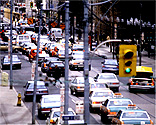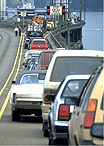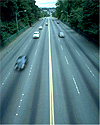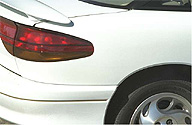Neuroscience For Kids
 When RED Means Stop (not Slow Down)
When RED Means Stop (not Slow Down)
March 17, 2008
Your brain is incredibly busy when you drive a car: your brain sends
messages to control muscles used to press pedals and turn the steering
wheel; your brain receives information from your eyes and ears; your
brain must pay attention to other cars and signals on the road. Inside of
a car, gauges, display lights and sounds help drivers navigate roads
safely. Outside of a car, streetlights, car lights, mirrors and noises
help drivers. But accidents still happen. In fact, there are
approximately 2,000,000 rear-end collisions in the United States each
year. These rear-end crashes cost billions of dollars and cause almost
1,000,000 injuries and 2,000 deaths.
Scott E. McIntyre (City University of New York and Brooklyn College)
may have a way to reduce the number of rear-end collisions: change the
colors of brake lights and tail lights. Currently, when cars have their
lights on, the tail lamp on the back of a car is red. When a car brakes,
a brighter red brake lamp comes on. This brighter red lamp tells a driver
to slow down because the car in front is coming to a stop or is already
stopped.
McIntyre thought that having different colored tail lamps and brake lamps would be safer way to travel. To prove his theory, McIntyre compared the reaction times and numbers of errors that people made when they identified brake lamps in pictures in two different conditions:
- Condition 1: Tail lamp color = RED; Brake lamp color = RED
- Condition 2: Tail lamp color = YELLOW; Brake lamp color = RED
 When tail lamps and brake lamps were different colors
(Condition 2), people were significantly faster and made significantly
fewer errors detecting brake lamps than they did when tail lamps and brake
lamps were the same colors (Condition 1).
When tail lamps and brake lamps were different colors
(Condition 2), people were significantly faster and made significantly
fewer errors detecting brake lamps than they did when tail lamps and brake
lamps were the same colors (Condition 1).
 Will yellow tail lamps and red brake lamps reduce the number of
rear-end crashes? Maybe, but more tests, especially real world situations
with cars on the road using this new combination of lights, must be
done.
Will yellow tail lamps and red brake lamps reduce the number of
rear-end crashes? Maybe, but more tests, especially real world situations
with cars on the road using this new combination of lights, must be
done.
Reference and more information:
- McIntyre, S.E., Capturing attention to brake lamps, Accident Analysis and Prevention, 40:691-696, 2008.
- National Highway Traffic Safety Administration
- Take the Red Light / Green Light Reaction Time Test
Copyright © 1996-2008, Eric H. Chudler, University of Washington
